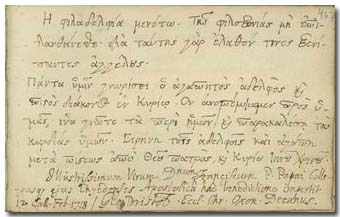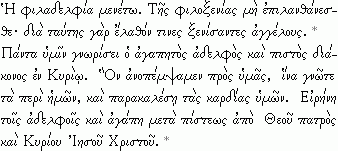

Illustrissimum Virum D[omi]num Franciscum P. Papai Collegasque
ejus Enyedenses Apostolicâ hâc benedictione impertit
Geo[rgius] Bristol Eccl. Chr. Oxon. Decanus.
12 Cal. Feb. 1718
|
* Heb 13:1-2: Vulgate: “caritas fraternitatis
maneat. hospitalitatem nolite oblivisci per hanc enim
latuerunt quidam angelis hospitio receptis.”
* Eph 6:21-23: Vulgate: “omnia nota vobis faciet
carissimus frater et fidelis minister in Domino. quem misi ad
vos in hoc ipsum ut cognoscatis quae circa nos sunt et
consoletur corda vestra. pax fratribus et caritas cum fide a
Deo Patre et Domino Iesu Christo.” – The first words of Eph 6:22
are different from the textus receptus: there one reads “hon
epempsa pros hymas eis auto touto”, while here “hon
apopempsamen pros hymas”.
|
|
|
|
Let brotherly love continue. Be not forgetful to entertain
strangers: for thereby some have entertained angels unawares *
A beloved brother and faithful minister in the Lord shall make
known you all things. Whom I have sent unto you for the same
purpose, that ye might know our affairs, and that he might comfort
your hearts. Peace be to the brethren, and love with faith, from
God the Father and the Lord Jesus Christ. *
Let this apostolic blessing accompany
the illustrious Ferenc Pápai Páriz and his colleagues in Nagyenyed
George, Bishop of Bristol,
Archdeacon of Christ's Church in Oxford
1718 [=1719], on the 12th day before the
calends of February
|
p.
467. Oxford, February 1, 1719
Smalridge, George
(1663-1719), English pastor, bishop
George Smalridge was born in Lichfield (Staffordshire) in 1663, a
son of the dyer Thomas Smalridge. He learned in the local school
when the renowned antiquarian Elias
Ashmole (1617-1692) recognized his qualities and sent him on his
own costs to the London Westminster School. Here he made a
life-long friendship with Francis Atterbury
(1663-1732), the later bishop and writer, whose Anglican ideas
deeply influenced him. In 1682 he immatriculated in Christ's
Church College in Oxford; in 1689 he became M.A. and tutor, and in
1701 he graduated in theology. An eminent work of him is the Auctio
Davisiana (Oxford, 1689) written in Latin verse. In 1694, at
the celebration of Sir
Thomas Bodley (1545-1613) he was invited to address an oration. In 1693
he received a canon's prebend in the cathedral of Lichfield.
Although from 1700 he was nominated substitute professor of
theology in Oxford, in 1707 his open Jacobite views prevented him
to be the successor of the professor William Jane
(1645-1707). In 1710, as a Tory counter-reaction, he was appointed
one of the chaplains of the Queen. He was in contact with a number
of theologians of his period, among others Daniel Ernst Jablonski,
and he made efforts to promote the rapprochement between Lutherans
and Anglicans. In 1711 he became a canon of Christ's Church in
Oxford and archdeacon of Carlisle, and in 1713 the archdeacon of
the Christ's Church, as the successor of Atterbury. In 1714 he was
nominated Bishop of Bristol and Lord Almoner. He was however
deprived of this later office in 1715, because he did not sign the
declaration against the Old Pretender (Jacob Edward,
1688-1766). He kept his archdeaconship until his death, because
the See of the Bishop of Bristol provided scarce income at that
time. He died in a sudden apoplexy on September 27, 1719. His son
Philip (?-1751) became Chancellor of Worcester. George Smalridge
was an erudite and popular preacher, a widely known personality in
the London of Queen Anne. He was also esteemed by his
fellow-countryman Dr. Samuel Johnson, and Jonathan Swift styled
him “the famous Dr. Smalridge”. His style – as it is general in
the theological works of the period – was clear, but without any
soaring and grace. Many of his sermons were printed
separately, sixty of them were also collected by his widow and
published in one volume: Sixty sermons, preach'd on
several occasions … publish'd from the originals. Oxford,
1724. London, 1727. … Oxford, 1852. – Bishop Atterbury's and
Bishop Smalridge's reasons for not signing the declaration …
London, 1715.
The New Testament verses written in the album
allude to hospitality and consolation, as it is appropriate for
the occasion. Bishop George gives his apostolic blessing to the
owner of the album and to his colleagues in Nagyenyed. As
customary, he only signs with his first name (even that
abbreviated), and the name of his Bishop's see, but also indicates
his title of Archdeacon of Oxford. He died eight months after the
visit of Pápai Páriz, at the age of 56. – The above mentioned Daniel Ernst
Jablonski had written in the album in 1711 in Berlin (p.
121).
•
DNB • Jöcher • Michaud |

